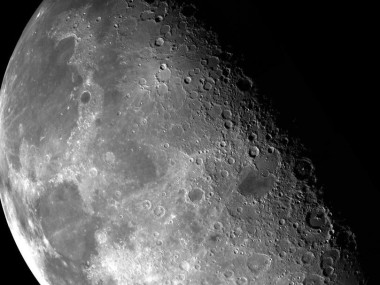NASA Would Create Time Standard For the Moon | iTechNews | NewsBreak Original
NASA recently revealed its intention to establish a distinct time standard tailored for the Moon. This significant initiative aims to enhance the coordination of activities and experiments conducted by astronauts and scientists during lunar missions. Let us explore further the intricacies of this pioneering project.
Why is a Time Standard Needed?
On Earth, we have the Coordinated Universal Time (UTC), which serves as the global time standard. However, the Moon operates under different conditions, such as its slower rotation and lack of atmosphere. This poses challenges when it comes to keeping track of time accurately. Having a time standard tailored to lunar conditions will allow for more precise scheduling and coordination during lunar missions.
How Will the Time Standard Be Established?
NASA plans to develop the lunar time standard based on the rotation of the Moon itself. The Moon's rotation period, known as a lunar day, is approximately29.5 Earth days long. This means that a lunar day is significantly longer than a day on Earth. To establish the time standard, NASA will need to define a unit of time that corresponds to a specific fraction of a lunar day.
Importance for Lunar Missions
Having a dedicated time standard for the Moon will greatly benefit future lunar missions. It will enable astronauts to synchronize their activities and communicate more effectively with Earth. Additionally, scientists conducting experiments on the Moon will be able to accurately record and analyze data based on the lunar time standard. This will enhance the precision and reliability of research conducted on our celestial neighbor.
Collaboration and International Standards
NASA's efforts to establish a lunar time standard are not isolated. The agency is working closely with other international space agencies, such as the European Space Agency (ESA), to ensure global cooperation and compatibility. Collaboration in developing a standard timekeeping system for the Moon will facilitate seamless coordination between different nations' lunar missions and increase the efficiency of scientific endeavors.
Future Applications
The creation of a lunar time standard has broader implications beyond lunar missions. As human exploration of space expands, establishing time standards for other celestial bodies, such as Mars or asteroids, may become necessary. The knowledge and experience gained through the development of a lunar time standard will lay the groundwork for future space exploration and colonization efforts.
Conclusion
NASA's initiative to create a time standard specifically for the Moon is an important step towards enhancing precision and coordination in lunar missions. This development will not only benefit astronauts and scientists working on the Moon but also pave the way for future space exploration endeavors. By establishing a lunar time standard, NASA is actively shaping the future of human presence in space.
https://tempaste.com/8mi9GsuPcXj
https://lifeisfeudal.com/forum/bzfsresartatrtr-t109113/
https://paste.ofcode.org/J9mAsPXJAXuwpf5XzhDXVZ
https://paste.kodi.tv/tanupocuce
https://paste.myst.rs/w3qhxtuq
https://dev.bukkit.org/paste/cd99879e
https://www.wowace.com/paste/0d932945
https://authors-old.curseforge.com/paste/0166b9aa
https://rift.curseforge.com/paste/31401b03
https://rextester.com/IWIJ93454
https://pastebin.com/ZP4VRs5S
https://glot.io/snippets/guwyndzbla
https://paste.ee/p/cpjpa
https://pastelink.net/32wauexu
https://binshare.net/d5c4T3l9Bvo7FRgWuze9
https://controlc.com/18413bfd
https://codebeautify.org/htmlviewer/y24a04104
https://hackmd.io/s/HkkvvVik0
https://jsitor.com/Y_xrqv5kxiH
https://jsfiddle.net/9hedcy3r/
https://yamcode.com/nfxghgdxhxhghghxhg
http://nopaste.paefchen.net/4898488
https://paste.feed-the-beast.com/view/cb36d27f
https://paiza.io/projects/AcVZF4R3b90fHz98a_iARg
https://www.forexagone.com/forum/questions-debutants/vnvhchg-cfhjcfhcjg-111517
https://ivss.tdcj.texas.gov/forums/general-discussion/84a4d673-edf1-ee11-a73d-001dd805fe7a
https://scribehow.com/shared/NASA_To_Create_Time_Standard_For_the_Moon_or_Scribe__-eNp355WQ9yFCjsnXInpOw
https://njit-connect.njit.edu/rwd/responsive-discussion-board?dgs3235=3&rid3235=8629&tid3235=3007
http://www.4mark.net/story/11774249/gfjfdgjdfggjgjjgfgfgfggf
https://test.dslab.digitalscholar.rochester.edu/wiki/index.php/NASA_To_Create_Time_Standard_For_the_Moon
https://qaqeane.blogspot.com/2024/04/the-compact-and-powerful-asus-mjolnir.html
https://techscience.news.blog/2024/04/04/all-you-know-about-asus-mjolnir-power-station/
https://medium.com/@itechnews/asus-mjolnir-power-station-618ecfa13118
https://itechnews.hashnode.dev/the-compact-and-powerful-asus-mjolnir-power-station
https://matters.town/@jemvut/563772-the-compact-and-powerful-asus-mjolnir-power-station-bafybeiazrfj7zd6f2sg7t4lrjahncpf63ucbm4typbze57i5uyapkcl24y
https://www.bizbangboom.com/articles/asus-mjolnir-power-station-can-charge-multiple-devices-simultaneously
https://www.digitalmethods.net/Sandbox/NASA-To-Create-Time-Standard-For-The-Moon
https://zrzutka.pl/k5tzwx
https://forum-th.msi.com/index.php?threads/nasa-to-create-time-standard-for-the-moon.30049/
https://plaza.rakuten.co.jp/itechnews/diary/202404040000/
https://www.reddit.com/r/badcantina/comments/1bv287o/nasa_to_create_time_standard_for_the_moon/
https://www.kaggle.com/code/comigsoon/notebook2f6ee1114b
https://original.newsbreak.com/@itechnews-1782783/3390825543962-nasa-would-create-time-standard-for-the-moon
https://info.undp.org/docs/dao/UNSP2015/Lists/PostSurvey/Item/displayifs.aspx?ID=55364
https://www.taskade.com/p/bxvcxvcb-sfysresersrey-01HTJRBEREAN3CW817459NSBV9
https://github.com/apps/hddfhfdhsdfhsdffdshhhfd
https://www.scoop.it/topic/twesgd
https://soundcloud.com/dzhokovi-dzhebran/dfdfsfdhhdfh
